2015年广州最新版五年级英语下册知识点和练习Unit1What's_your_favourite_seasons--U12I_know_a_short_cut
- 格式:docx
- 大小:7.11 MB
- 文档页数:95
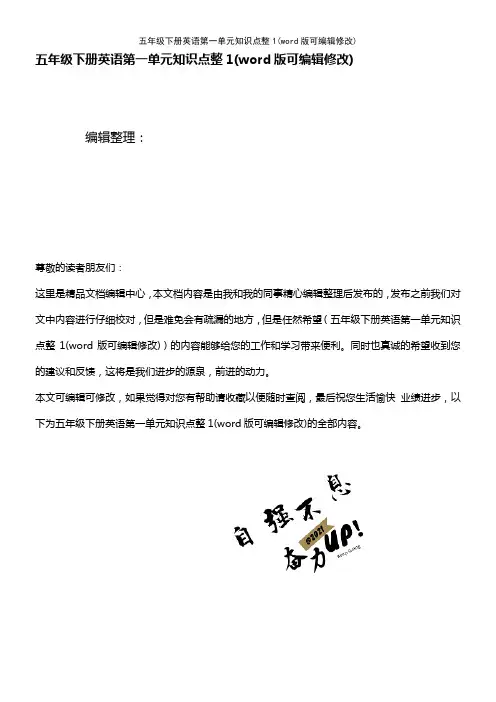
五年级下册英语第一单元知识点整1(word版可编辑修改)编辑整理:尊敬的读者朋友们:这里是精品文档编辑中心,本文档内容是由我和我的同事精心编辑整理后发布的,发布之前我们对文中内容进行仔细校对,但是难免会有疏漏的地方,但是任然希望(五年级下册英语第一单元知识点整1(word版可编辑修改))的内容能够给您的工作和学习带来便利。
同时也真诚的希望收到您的建议和反馈,这将是我们进步的源泉,前进的动力。
本文可编辑可修改,如果觉得对您有帮助请收藏以便随时查阅,最后祝您生活愉快业绩进步,以下为五年级下册英语第一单元知识点整1(word版可编辑修改)的全部内容。
五年级下册英语第一单元知识点整理1、主要单词和短语:do morning exercises 晨练,做早操 eat breakfast 吃早饭have English class 上英语课 eat dinner 吃晚饭go for a walk 散步 play sports 进行体育活动take a dancing class 上舞蹈课 eat lunch 吃午饭climb mountains 爬山 go shopping 购物,买东西play the piano 弹钢琴 go to bed 上床睡觉watch Tv 看电视 play music 弹奏音乐wash my clothes 洗我的衣服 clean my room 打扫我的房间on the weekend 在周末二、主要句子:When do you eat dinner?你什么时候吃晚饭?I eat dinner at 7:00 in the evening。
我晚上七点吃晚饭。
When do you get up? 你什么时候起床?I usually get up at 12:00 at noon. 我通常在中午12点起床。
What do you do on the weekend?你在周末干什么?Usually I watch TV and go shopping。
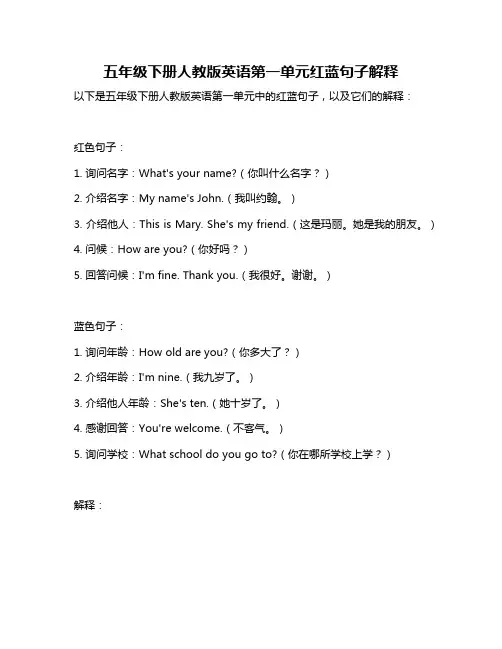
五年级下册人教版英语第一单元红蓝句子解释
以下是五年级下册人教版英语第一单元中的红蓝句子,以及它们的解释:
红色句子:
1. 询问名字:What's your name?(你叫什么名字?)
2. 介绍名字:My name's John.(我叫约翰。
)
3. 介绍他人:This is Mary. She's my friend.(这是玛丽。
她是我的朋友。
)
4. 问候:How are you?(你好吗?)
5. 回答问候:I'm fine. Thank you.(我很好。
谢谢。
)
蓝色句子:
1. 询问年龄:How old are you?(你多大了?)
2. 介绍年龄:I'm nine.(我九岁了。
)
3. 介绍他人年龄:She's ten.(她十岁了。
)
4. 感谢回答:You're welcome.(不客气。
)
5. 询问学校:What school do you go to?(你在哪所学校上学?)
解释:
这些红色和蓝色句子都是该单元中的重点句型,用于基本的自我介绍和问候他人。
通过这些句子,学生可以学习如何与人交流,包括询问和回答关于名字、年龄、学校等基本信息,以及表达感谢等基本社交礼仪。
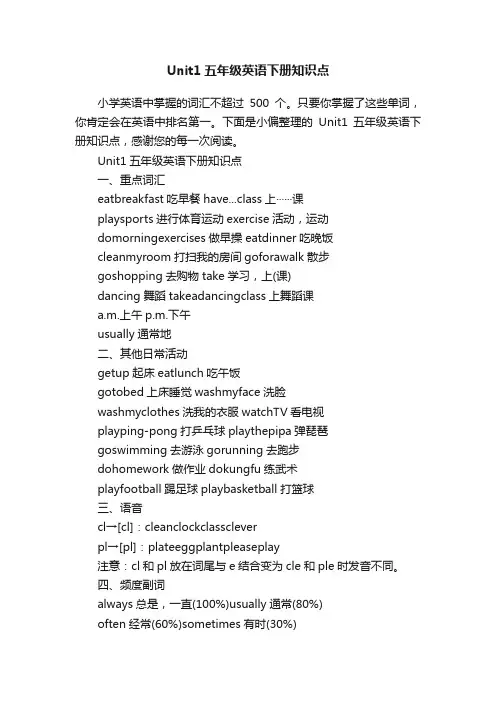
Unit1五年级英语下册知识点小学英语中掌握的词汇不超过500个。
只要你掌握了这些单词,你肯定会在英语中排名第一。
下面是小偏整理的Unit1五年级英语下册知识点,感谢您的每一次阅读。
Unit1五年级英语下册知识点一、重点词汇eatbreakfast吃早餐have...class上······课playsports进行体育运动exercise活动,运动domorningexercises做早操eatdinner吃晚饭cleanmyroom打扫我的房间goforawalk散步goshopping去购物take学习,上(课)dancing舞蹈takeadancingclass上舞蹈课a.m.上午p.m.下午usually通常地二、其他日常活动getup起床eatlunch吃午饭gotobed上床睡觉washmyface洗脸washmyclothes洗我的衣服watchTV看电视playping-pong打乒乓球playthepipa弹琵琶goswimming去游泳gorunning去跑步dohomework做作业dokungfu练武术playfootball踢足球playbasketball打篮球三、语音cl→[cl]:cleanclockclasscleverpl→[pl]:plateeggplantpleaseplay注意:cl和pl放在词尾与e结合变为cle和ple时发音不同。
四、频度副词always总是,一直(100%)usually通常(80%)often经常(60%)sometimes有时(30%)五、疑问词why为什么when什么时候六、重点句型1.询问别人什么时候做某事的句型及回答。
句型结构:问:Whendoyou+动词短语原形+其他?(你/你们什么时候做某事?)答:I/we(+频度副词)+动词短语原形+at+具体时间.(我/我们通常在几点做某事。
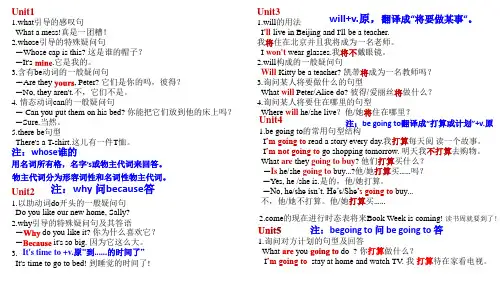
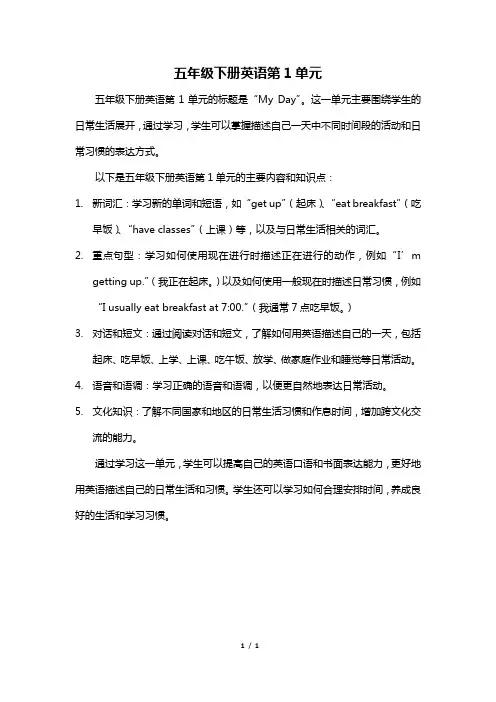
五年级下册英语第1单元
五年级下册英语第1单元的标题是“My Day”。
这一单元主要围绕学生的日常生活展开,通过学习,学生可以掌握描述自己一天中不同时间段的活动和日常习惯的表达方式。
以下是五年级下册英语第1单元的主要内容和知识点:
1.新词汇:学习新的单词和短语,如“get up”(起床)、“eat breakfast”(吃
早饭)、“have classes”(上课)等,以及与日常生活相关的词汇。
2.重点句型:学习如何使用现在进行时描述正在进行的动作,例如“I’m
getting up.”(我正在起床。
)以及如何使用一般现在时描述日常习惯,例如“I usually eat breakfast at 7:00.”(我通常7点吃早饭。
)
3.对话和短文:通过阅读对话和短文,了解如何用英语描述自己的一天,包括
起床、吃早饭、上学、上课、吃午饭、放学、做家庭作业和睡觉等日常活动。
4.语音和语调:学习正确的语音和语调,以便更自然地表达日常活动。
5.文化知识:了解不同国家和地区的日常生活习惯和作息时间,增加跨文化交
流的能力。
通过学习这一单元,学生可以提高自己的英语口语和书面表达能力,更好地用英语描述自己的日常生活和习惯。
学生还可以学习如何合理安排时间,养成良好的生活和学习习惯。
1/ 1。
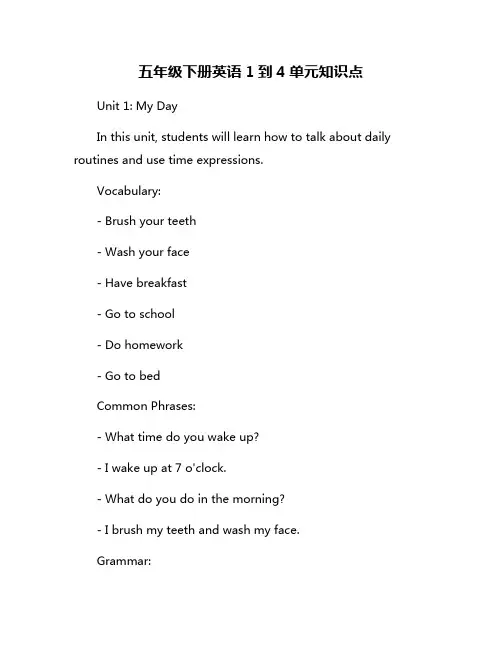
五年级下册英语1到4单元知识点Unit 1: My DayIn this unit, students will learn how to talk about daily routines and use time expressions.Vocabulary:- Brush your teeth- Wash your face- Have breakfast- Go to school- Do homework- Go to bedCommon Phrases:- What time do you wake up?- I wake up at 7 o'clock.- What do you do in the morning?- I brush my teeth and wash my face.Grammar:- Present Simple Tense: Students will practice using the present simple tense to talk about daily routines.Unit 2: My FamilyIn this unit, students will learn how to introduce family members and describe their appearance and personality.Vocabulary:- Mother- Father- Sister- Brother- Grandmother- GrandfatherCommon Phrases:- Who is she?- She is my mother.- What does your father look like?- He is tall and has brown hair.Grammar:- Present Continuous Tense: Students will practice using the present continuous tense to describe what family members are doing.Unit 3: My SchoolIn this unit, students will learn how to describe their school, classroom, and school subjects.Vocabulary:- Classroom- Desk- Whiteboard- Library- Playground- Math- Science- ArtCommon Phrases:- Where is your classroom?- My classroom is on the second floor.- What is your favorite subject?- My favorite subject is art.Grammar:- Can / Can't: Students will practice using "can" and "can't" to talk about abilities and limitations.Unit 4: My HobbiesIn this unit, students will learn how to talk about their hobbies and interests.Vocabulary:- Play soccer- Draw- Dance- Sing- Swim- Play chessCommon Phrases:- What do you like to do in your free time?- I like to play soccer with my friends.- Do you enjoy painting?- Yes, I love to draw and paint.Grammar:- Present Simple Tense: Students will review the present simple tense to talk about hobbies and interests.。
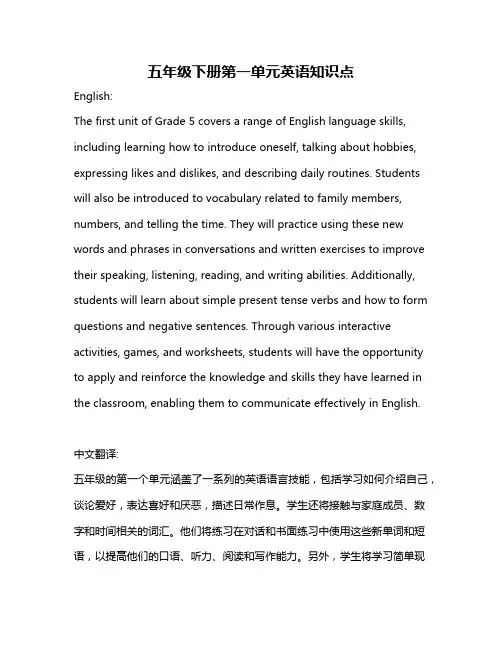
五年级下册第一单元英语知识点English:The first unit of Grade 5 covers a range of English language skills, including learning how to introduce oneself, talking about hobbies, expressing likes and dislikes, and describing daily routines. Students will also be introduced to vocabulary related to family members, numbers, and telling the time. They will practice using these new words and phrases in conversations and written exercises to improve their speaking, listening, reading, and writing abilities. Additionally, students will learn about simple present tense verbs and how to form questions and negative sentences. Through various interactive activities, games, and worksheets, students will have the opportunity to apply and reinforce the knowledge and skills they have learned in the classroom, enabling them to communicate effectively in English.中文翻译:五年级的第一个单元涵盖了一系列的英语语言技能,包括学习如何介绍自己,谈论爱好,表达喜好和厌恶,描述日常作息。
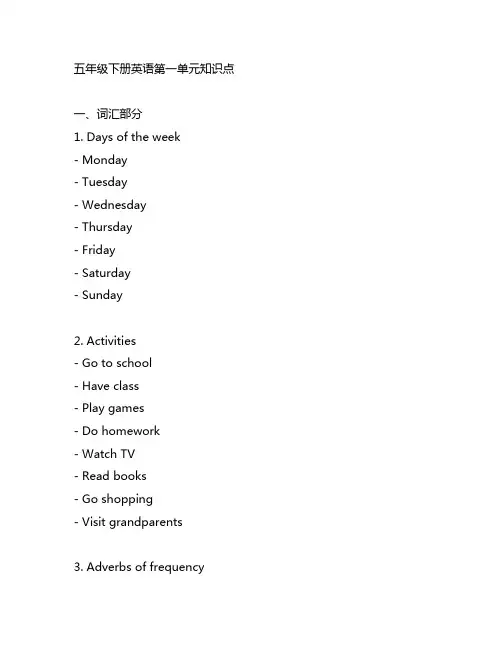
五年级下册英语第一单元知识点一、词汇部分1. Days of the week- Monday- Tuesday- Wednesday- Thursday- Friday- Saturday- Sunday2. Activities- Go to school- Have class- Play games- Do homework- Watch TV- Read books- Go shopping- Visit grandparents3. Adverbs of frequency- Always- Usually- Often- Sometimes- Rarely- Never二、句型部分1. What do you do on weekends?- I play games on weekends.- I do homework on weekends.2. What does he/she do on weekends?- He/She watches TV on weekends.- He/She visits grandparents on weekends.3. What do they do on weekends?- They go shopping on weekends.- They read books on weekends.4. Adverbs of frequency in sentences- I always play games with my friends.- She usually does her homework after school.- We often watch TV in the evening.- They sometimes go shopping on weekends.- He rarely reads books.- She never visits her grandparents.三、语法部分1. Present simple tense- Affirmative: I/You/We/They + base form of the verb- Negative: I/You/We/They + do not + base form of the verb - Question: Do + I/You/We/They + base form of the verb? - He/She/It: follows the base form of the verb with 's' or 'es'2. Using adverbs of frequency- Adverbs of frequency are placed before the main verb in a sentence.3. Days of the week- Capitalize the first letter of each day of the week.四、阅读部分1. Short passages about weekend activities- Readingprehension questions related to the passages- Describing one's own weekend activities2. Matching activities with the days of the week- Matching the correct activity with the corresponding day of the week- Describing the activities of each day3. Writing about one's own weekend activities- Describing the activities one does on weekends using adverbs of frequency- Using simple present tense to talk about weekend activities五、口语部分1. Role-playing conversations- Conversations about weekend activities- Practicing asking and answering questions about weekend activities2. Describing weekend activities- Speaking confidently and fluently about one's own weekend activities- Using appropriate adverbs of frequency in speech六、写作部分1. Writing sentences using adverbs of frequency- Writing sentences about one's own activities using adverbs of frequency- Describing the frequency of various activities2. Short paragraph writing about weekend activities- Writing a short paragraph about one's own weekend activities - Using simple present tense and adverbs of frequency in writing总结五年级下册英语第一单元知识点主要包括词汇、句型、语法、阅读、口语和写作部分。
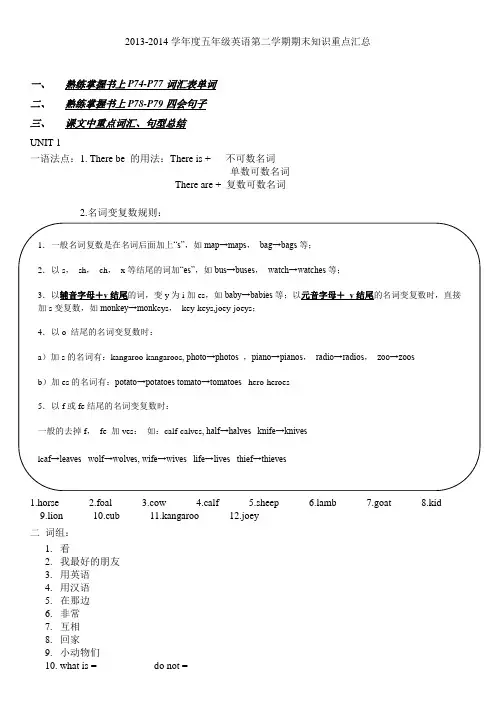
一、熟练掌握书上P74-P77词汇表单词二、熟练掌握书上P78-P79四会句子三、课文中重点词汇、句型总结UNIT 1一语法点:1. There be 的用法:There is + 不可数名词单数可数名词There are + 复数可数名词2.名词变复数规则:1.horse______2.foal______3.cow______4.calf______5.sheep______mb______7.goat______8.kid____ __9.lion______10.cub______11.kangaroo______12.joey______二词组:1.看_________________2.我最好的朋友_________________3.用英语_________________4.用汉语_________________5.在那边_________________6.非常_________________7.互相_________________8.回家_________________9.小动物们_________________10.what is = _________ do not =________11.在。
附近_________________12.一只小山羊_________________13.制作动物_________________14.互相帮助_________________三句型:1.看着匹马。
_________________2.多么好的一匹马呀!_________________3.看!那边有一匹小马。
____________________________4.你们用英语怎么称呼它?___________________________答语_________________5.这个用英文怎么说?_________________________答语_________________6.那个用英文怎么说?_________________________答语_________________7.那很有趣。

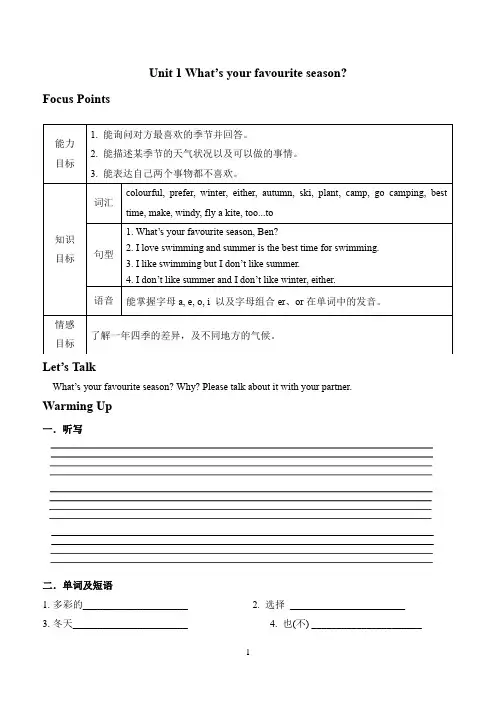
Unit 1 What’s your favourite season?Focus PointsLet’s TalkWhat’s your favourite season? Why? Please talk about it with your partner.Warming Up一.听写二.单词及短语1.多彩的_____________________2. 选择_______________________3.冬天_______________________4. 也(不) ______________________5.秋天_______________________6. 滑雪________________________7.种植_______________________8. 去野营______________________9. 最好的时间_________________10. 更喜欢_____________________ 11. 堆雪人____________________ 12. 放风筝_____________________三.课文内容根据提示把句子补充完整。
Xiaoling: Look at all the _______ _______(多彩的花)and the beautiful birds _____ the trees. I really love __________.(春天)_______ ________ ________________,Ben? (你最喜欢哪个季节)Ben: Summer. I love __________(游泳) and _________(夏天)is the best time _________swimming. _________ you like summer, Jiamin?Jiamin: I like swimming ________I don’t like summer. It is too hot. I _______________.(更喜欢冬天)__________(当......)it snows, I can _________________ _________(堆雪人).Janet: I _______like summer and I don’t like winter,_______.(也) My favourite season is autumn. It’s very windy and I can ________ _________ ________.Language Points【知识考点一】in the tree 和on the tree都可以表示“在树上”;in the tree表示外来的东西在树上;on the tree表示树本身的东西。
Unit 1 This Is My Day重点单词do morning exercises晨练eat breakfast吃早饭have English class上英语课play sports进行体育运动eat dinner吃晚饭when什么时候evening夜晚;晚上get up起床at在……点钟usually通常;一般noon中午climb mountains爬山go shopping购物;买东西play the piano弹钢琴visit grandparents看望祖父母go hiking去远足weekend周末often经常sometimes有时候话题1:日常生活时态:一般现在时1.——When do you do morning exercises? 你什么时候做早操?——I usually do morning exercises at 8:00. 我经常八点钟做早操。
(I usually get up at 12:00 at noon. 我经常在中午十二点起床。
) 2.——When do you eat dinner ? 你什么时候吃晚餐?——I eat dinner at 7:00 in the evening. 我在晚上七点种吃晚餐。
3.——When is the best time to go to Beijing? 最好在什么时候去北京?——Fall. 秋天。
4.——What do you do on the weekend ?你周末的时候在做什么?——I often go shopping. 我经常购物。
5. Thank you for tell ing me about your day. 谢谢你告诉我你的一天。
语法考点:1.When引导的特殊疑问句,就作息时间进行问答:--- When do you + 行为活动?--- I + 行为活动+ 具体时间。
例:A: When do you eat dinner? B: I eat dinner at 7: 00. .2.What引导的特殊疑问句,就活动内容进行问答:--- What do you do + 时间?(教材主要是周末)--- I + sometimes / often / usually + 行为活动+ 时间。
Unit1知识点与习题词组:1.在星期一上午on Monday morning2. 今天下午this afternoon3 .三节数学课three Maths lessons4 .新学期the new term5. 第一节课the first lesson 6 .立刻、马上at once7 .10门学科ten subjects 8 .一节有趣的课an interesting lesson9 .你呢?How about you? 10 .在一周内in a week11 .欢迎回来welcome back 12. 我的课程表my timetable13. 在星期三on Wednesday 14 .星期天晚上Sunday evening15 .这个学期this term 16. 上一堂艺术课have an Art lesson17 .每天every day 18.一个窍门a trick19 .让我想想let me see 20 .非常very much句型:1.我们可以用下列句型来谈论学习的科目、课表,如:What lessons do you have in the morning/afternoon? 上午/下午你们有什么课程?What lessons do you have on Monday/ Wednesday? (注意:在星期几用on)星期一/星期三你们有什么课程?What subject do you like? 你喜欢什么科目?I like English. How about you? 我喜欢英语。
那你呢?I like Science. 我喜欢科学。
2.我们想要询问今天是星期几时,可以用;-- What day is it today? -- It’s Monday.-- What day is it? - Today is Wednesday.3.Nice to see you. (同义句) Nice to meet you.词形转换 :China(形容词)—Chinese here(同音词)—hearlesson(同义词)—class good(反义词)—badinterest(形容词)—interesting buy(同音词)—by/byeminus(反义词)—plus she(宾格)—herright(同音词)—write he(宾格)—himright(反义词)—wrong open(反义词)—close一、英汉互译1.第一节课__________________2.在晚上_____________________3.在星期一早上_______________4.一周中_____________________5.一本有趣的书_______________6.上更多的体育课______________7.at once____________________8.have an English lesson_________9.I hope_____________________10.Welcome back to school._______ 11.两节数学课________________12.新学期第一天________________ 13.every day__________________14.this afternoon_______________ 15.let me see_________________16.What’s the trick?____________ 17.八门科目__________________18.What subject do you like?______ 19.thirty minus thirteen__________20.多少节课___________________21.寻找______________________ 22.课后_______________________二、按要求写出下列单词1. do(第三人称单数)__________2. lesson(近义词) __________3. these(对应词) __________4. hot(对应词) __________5. plus(近义词) __________6. her(主格) __________7. class(复数形式) __________8. parents(所有格) __________9.children(单数形式) __________ 10. write(同音词) __________三、根据单词首字母和句子意思,将对话中的单词补充完整A: Welcome b________ to school, Ben.B: Nice to m________ you, Mr Green.A: There is a n________ subject in this t_______, do you know?B: Yes. It’s S________ S________.A: Do you l________ it?B: Maybe. I t________ it will be i________.A: Of course. When do you h________ this l________? On M________? B: No. It’s on F________. W________ will teach us, Mr Green?A: Mr Zhang. He is a very good t________.六、完成句子.1.你喜欢什么学科? 我喜欢语文.What _______ do you like? I like __________.2.星期二你们有什么课?What _______ do you have ______ Tuesday.3.这是新学期的第一节课.This is the _______ ________ of the new term.4.放学了. 让我们弄点儿吃的.School is over. Let’s go and _______ something to _________.七.句型转换.1. It’s Monday today.(对划线部分提问)______ ______ is it today?2. I like English and Art. (改为一般疑问句)_____ you _____ English and Art?3. her, are, Miss Li, a, and, lesson, having, students ( . ) (连词成句)___________________________________________4.What lessons do you have?(用Tom替换you)___________________________________________5.321 minus 123 is 198.(对划线部分提问)________________________________。
五年级英语下册知识点五年级英语下册是指小学五年级下学期的英语教材内容,主要涉及日常生活、学校生活、家庭、食物、动物、天气、节日等方面的知识。
下面是五年级英语下册的相关知识点参考内容。
1. 日常生活1.1 表达日常活动:brush one's teeth, wash one's face, get dressed, have breakfast, go to school, go home, do homework, go to bed等1.2 表示一天的时间顺序:morning, afternoon, evening, night等1.3 问答句式:What time do you...? What's your day like?2. 学校生活2.1 学习科目:Chinese, English, math, music, art, P.E.等2.2 学习用具:pen, pencil, eraser, ruler, notebook等2.3 学校设施:classroom, library, playground, computer room等2.4 学校活动:sing songs, play games, draw pictures, read books 等3. 家庭3.1 家庭成员:father, mother, sister, brother, grandparents等3.2 家庭活动:have dinner together, watch TV, play games等3.3 家庭用品:table, chair, bed, sofa, fridge, TV等4. 食物4.1 水果:apple, banana, orange, grape, mango等4.2 蔬菜:carrot, tomato, cabbage, potato, onion等4.3 主食:rice, noodles, bread, porridge等4.4 饮料:milk, water, juice, tea等4.5 能力:can/can't+动词原形:I can swim. I can't cook.5. 动物5.1 野生动物:elephant, tiger, lion, giraffe, zebra等5.2 宠物动物:cat, dog, rabbit, goldfish等5.3 鸟类:bird, duck, pigeon, ostrich等5.4 动物特征和习性:big, small, fast, slow, eat grass, swim, fly等6. 天气6.1 天气状况:sunny, cloudy, rainy, snowy, windy等6.2 询问天气:What's the weather like today?7. 节日7.1 重要节日:New Year’s Day, Spring Festival, Mid-Autumn Festival, Christmas等7.2 节日习俗:eat dumplings, watch fireworks, give gifts等此外,五年级英语下册还会涉及一些简单的时态和语法知识,如一般现在时、一般过去时、there be句型、连词and、but、because等的使用等。
Unit1 My day知识整理△:每天的活及安排△:do morning exercises〔做早操〕eat breakfast/lunch/dinner 〔吃早餐/午餐/晚餐〕have...class 〔上⋯〕,play sports〔做运〕cleanmyroom 〔打我的房〕,goforawalk( 散步)go shopping〔物〕,takeadancingclass 〔上舞蹈〕△拓展:get up〔起床〕,go to bed〔上床睡〕washmyclothes 〔洗我的衣服〕,watchTV〔看〕dohomework 〔做作〕,playmusic 〔演奏音〕cookdinner 〔煮晚餐〕,athome〔在家〕inthemorning 〔在上午〕,intheafternoon 〔在下午〕intheevening 〔在晚上〕,atnight 〔在半夜〕△句型:①做某事在几点Whendoyou+原形〔短〕+其他?——At+——I(+度副)+原形〔短〕+at+。
例句:Whendo you getup in the morning?——At7:30.——I oftengetup at 7:30.②周末的活安排What do you often do on the weekend?1I often (always/sometime/usually) +⋯〔周末的活〕+with ⋯〔某人〕+ontheweekend〔onSaturdays/on Sundays〕.例句:What do you do on the weekend?I often take a dancing class with my friendon Sundays. △知点:1:注意介的搭配at+具体〔几点〕/night/homeat9o’clockin+国家/季inSpainon+星期ontheweekend/onSundayswith+人withmyfather/mother/friend2:表示率的区always 表示是,一直;usually 表示常,通常;可放于句首often表示常,常常;sometimes表示有,或。
【随堂练习】一、用所给的单词填空。
go skiing go swimming plant flowers fly a kite1.We can ___________ in winter.2.We can ___________ in summer.3.We can ___________ in spring.4.We can __________ in autumn.二、根据中文意思,把下列句子补充完整。
1.She likes _________ (去野营) in summer.2.They always __________ (在户外玩耍) at the weekend.3. It’ s hot is summer. I(更喜欢)spring.4.My ____________ (最喜欢的水果) is grapes.5.Look at the ____________ (五颜六色的花) . Do you like them?三、把与图对应句子的编号写在括号内。
1.I often go swimming in summer.2.We can see many beautiful flowers in spring.3.Autumn is the best season to travel.4.The people usually sit by the fire in the evening of winter.四、单项选择。
( ) 1. I _____ like summer. It ’ s very hot.A. /B. doC. don ’t( ) 2. There is a cat _____ the tree. Can you see it?A. inB. onC. between( ) 3. Summer is best for ______.A. swimB. swimmingC. swims( ) 4. My favourite subject is _______.A. springB. AprilC. Chinese( ) 5. ---_______ season do you like best? ---Spring.A. WhichB. WhatC. Why( ) 6. I don ’ t like rainy days. I don ’ t like hot days ________.A. tooB. bothC. either( ) 7. When the weather is ______, we can fly a kite.A. cloudyB. snowyC. windy( ) 8. ---_______ he like skating? ---Yes, he does.A. DoesB. IsC. Can( ) 9. How many ________ are there in a year?A. monthB. seasonsC. day( ) 10. He likes ________ flowers in spring.A. plantsB. plantingC. plant五、选择合适的答句。
五下英语第一单元核心句型知识点英文回答:Generally speaking, the language points of Unit 1 in English Book 5 for Grade 5 are as follows:1. Asking for and giving information about time.2. Expressing frequency of actions.3. Talking about daily routines.4. Making suggestions.5. Describing people's characteristics.中文回答:五下英语第一单元核心句型知识点。
1. 询问和提供时间信息。
What time is it? 现在几点?It's seven o'clock. 现在是七点。
What time do you get up? 你几点起床?I get up at six o'clock. 我六点起床。
2. 表示动作的频率。
How often do you play basketball? 你多久打一次篮球?I play basketball twice a week. 我每周打两次篮球。
How many times a day do you brush your teeth? 你一天刷几次牙?I brush my teeth three times a day. 我一天刷三次牙。
3. 谈论日常生活。
What do you do every day? 你每天做什么?I get up at six o'clock, brush my teeth, eat breakfast, go to school, come back home, do my homework,and go to bed. 我六点起床,刷牙,吃早餐,去上学,回家,做作业,然后去睡觉。
Module 1 SeasonsUnit 1 What’s your favourite season?一、单词回顾:多彩的________ 选择;宁愿要_______ 冬天________ 也_________秋天_________ 滑雪___________ 种植;植物_______ 野营_______去野营_________二、重点短语:go skiing 去滑雪plant flowers 种花play outdoor 在户外玩look at 看…… in the tree 在树上really love 确实喜欢like swimming 喜欢游泳go skiing 去滑雪make a snowman 堆雪人fly a kite 放风筝三、重点句型:1. --What‘s your favourite season? --My favourite season is summer.2. –What season do you like best? --I like spring best.四、重点分析:1. in the tree 和on the tree 都可以表示―在树上‖;in the tree表示外来的东西在树上;on the tree表示树本身的东西。
the birds ___ the tree the fruit ___ the treethe flowers ___ the tree the cat ___ the tree2. the best time for swimming = the best time to swim [注意for 后面的动词要用ing形式,to 后面要用动词原形。
When is the best time for visiting Beijing / to visit Beijing ?3. prefer表示对比,意思是―更喜欢;更愿意,宁愿;更倾向于…..‖I don‘t want to go out. I prefer to stay at home.4. either 用于否定句中,表示―也‖,相当于肯定句或疑问句中的―too‖。
My father loves hot food. My mother enjoys hot food too.My father can‘t drive. My mother can‘t drive either.【随堂练习】一、用所给的单词填空。
go skiing go swimming plant flowers fly a kite1. We can ___________ in winter.2. We can ___________ in summer.3. We can ___________ in spring.4. We can __________ in autumn.二、根据中文意思,把下列句子补充完整。
1. She likes _________ (去野营)in summer.2. They always __________ (在户外玩耍)at the weekend.3. It‘s hot is summer. I _________ (更喜欢)spring.4. My ____________ (最喜欢的水果)is grapes.5. Look at the ____________ (五颜六色的花). Do you like them?三、把与图对应句子的编号写在括号内。
1. I often go swimming in summer.2. We can see many beautiful flowers in spring.3. Autumn is the best season to travel.4. The people usually sit by the fire in the evening of winter.模块练习(一)听力训练一、听句子,写出所缺的单词。
1. There are many pictures on the wall. The classroom looks ___________.2. Winter is the best time for _________.3. I think _______ is the best time for fishing.4. There is a skirt and address on the bed. I ________ the dress.5. The children on the farm often play __________ a lot.6. What do the farmers ________ on their farm?7. Let‘s go __________ this weekend.8. What is your favourite _________, Ben?二、判断听到的内容与图片内容是否一致。
如一致,在括号写―T‖,否则写―F‖(二)笔试三、读下面单词,找出发音不同的一项。
( ) 1. A. doctor B. summer C. farmer D. what ( ) 2. A. China B. apple C. again D. cinema ( ) 3. A. jacket B. reporter C. before D. like ( ) 4. A. photo B. to C. tomato D. mango ( ) 5. A. rabbit B. animal C. like D. It 四、单项选择。
( ) 1. I _____ like summer. It‘s very hot.A. /B. doC. don‘t( ) 2. There is a cat _____ the tree. Can you see it?A. inB. onC. between( ) 3. Summer is best for ______.A. swimB. swimmingC. swims( ) 4. My favourite subject is _______.A. springB. AprilC. Chinese( ) 5. ---_______ season do you like best? ---Spring.A. WhichB. WhatC. Why( ) 6. I don‘t like rainy days. I don‘t like hot days ________.A. tooB. bothC. either( ) 7. When the weather is ______, we can fly a kite.A. cloudyB. snowyC. windy( ) 8. ---_______ he like skating? ---Yes, he does.A. DoesB.IsC. Can( ) 9. How many ________ are there in a year?A. monthB. seasonsC. day( ) 10. He likes ________ flowers in spring.A. plantsB. plantingC. plant五、选择合适的答句。
1. What‘s your favourite season, Jack? A. Four.2. What‘s the weather like in summer? B. Because I can fly kites.3. Which season does Sarah like best? C. It‘s usually sunny and hot.4. Why do you like spring? D. Fall is my favourite.5. How many seasons are there in a year? E. She likes winter.六、阅读下面对话,完成表格。
Goat: What‘s your favourite season, Mr Bear?Bear: Winter.Goat: Why do you like winter?Bear: Because I can sleep for a long time. What about you?Goat: Oh, I like spring best. In spring the grass turns green and I can eat. Which seas on do you like best, Miss Monkey?Monkey: I like summer best. I can play with my friends in the trees. What about you, Mr Rabbit?Rabbit: I like fall best. Because there are many fruits and vegetables in fall.七、阅读短文,对的写―T‖,错的写―F‖。
There are five animals living in a big house. They are Mr Pig, Mr Frog, Miss Bird, M r Snake and Miss Bear. They are good friends. They play together. In spring, Miss Bird is very happy. Because spring is her favourite season. She can sing and dance all day. I n summer, Mr Frog is happy. Because he can swim in the river. But Mr Pig doesn‘t like s ummer because it‘s too hot. In fall, Mr Pig is very happy, because it‘s windy and cool. H e can eat a lot of food. In winter Mr Snake and Miss Bear are happy. Because they can sleep a long time.( ) 1. There are five animals living in a small house.( ) 2. Mr Frog‘s favourite season is summer.( ) 3. Miss Bird likes spring best because she can sleep a long time.( ) 4. Mr Pig‘s favourite season is fall.( ) 5. Mr Snake and Miss Bird like winter best because they can skate.八、根据所给的单词,仿照例子写句子。